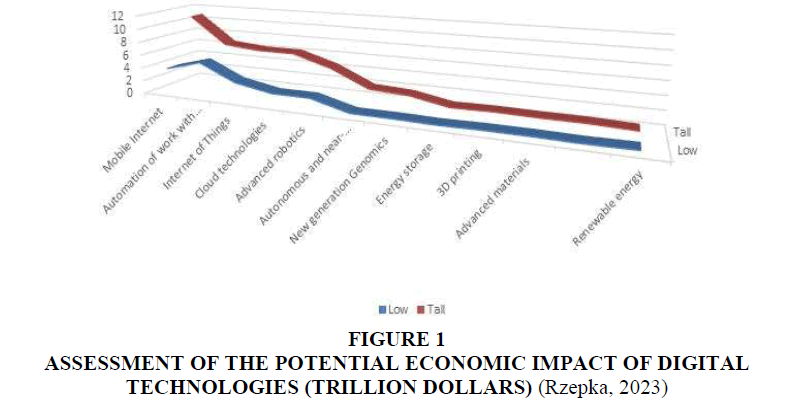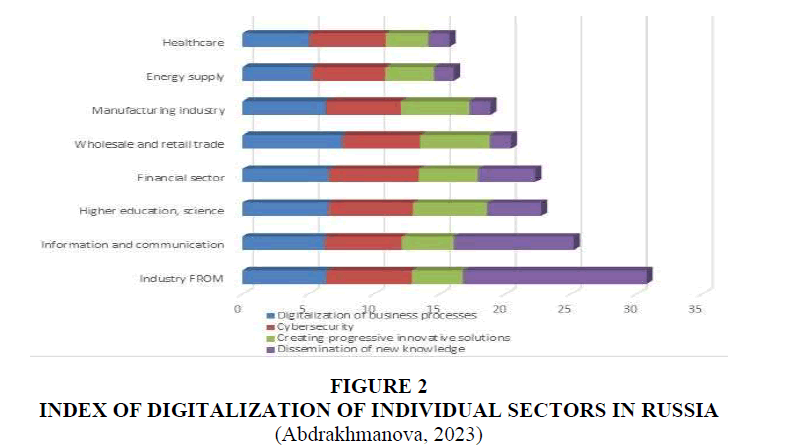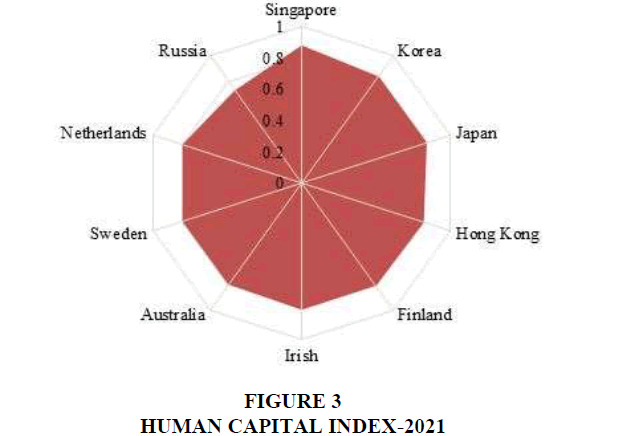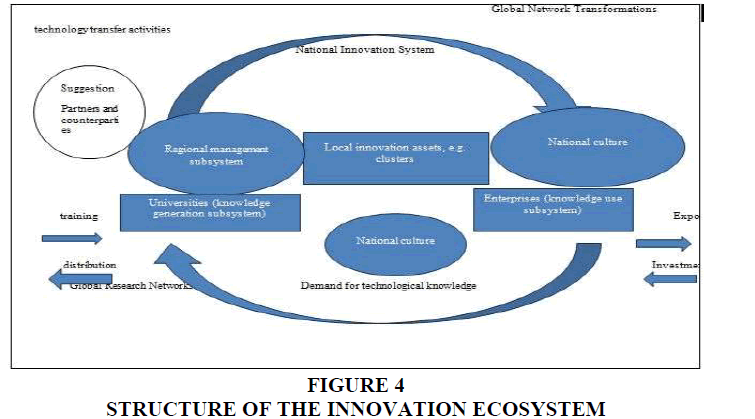Research Article: 2023 Vol: 26 Issue: 5
Prerequisites for the Innovative Development of the System of Higher Professional Education in Russia
Narymen Benrachou, Kazan Federal University
Paley Tatiana Feliksovna, Kazan Federal University
Citation Information: Benrachou, N., & Feliksovna, P.T. (2023). Prerequisites for the innovative development of the system of higher professional education in russia. Journal of Entrepreneurship Education, 26(5),1-8.
Abstract
Over the past three decades there has been a vigorous academic effort to understand the internal dynamics of the "knowledge economy" and the digital revolution. Firms in modern economies invest in a broader range of intangible assets, such as R&D, data, software, patents, design, specific personnel skills. Taken together, these non-physical assets constitute knowledge-based capital. Investment in knowledge is economy-wide; it is not limited to high-tech sectors or to R&D alone. Currently, in developed countries they exceed material investments and have become one of the predominant features of the modern economy. Russia is among the top ten countries in terms of R&D expenditures. These circumstances are clear evidence that the role of universities in an economy dominated by knowledge-based capital formation and innovation-based economic growth cannot be underestimated. In view of the above, the purpose of the article is to formalize the prerequisites for innovative development of the system of higher professional education in the Russian Federation and develop recommendations aimed at enhancing the inclusion of universities in the innovation ecosystem of the country. Research methods: statistical and comparative analysis, generalization, abstract-logical approach, systematization, modeling, grouping. Results: The article outlines the features and trends of the digital revolution at the present stage, highlighting its driving factors and the role of innovative universities in ensuring the countries' progress. In order to realize the potential available in Russia, the structure of the innovation ecosystem is formalized and targeted tools are highlighted, which will ensure greater involvement and inclusion of universities in achieving digital leadership and technological sovereignty of the country.
Keywords
University, Innovation, Technology, Economy, RUSSIA, Digitalization, Research, Investment, Human Resources, Ecosystem.
Introduction
Modern civilization is not only witnessing the birth of the digital revolution, but can also observe how it is accelerating every day. Progress in automation, digitization of information, unprecedented access to data and democratization of knowledge are transforming all sectors of the economy - from healthcare to transport, energy and commerce. The scale, scope and ubiquity of these changes are unprecedented. The digital revolution has led to the emergence of a completely new economy with a new kinetic energy and form of representation. In an era when knowledge became the main productive force, it gradually led to profound structural shifts throughout society. Today, there is no doubt that an effective combination of innovation and knowledge can give rise to a rapidly growing, successful economic system.
According to a recent McKinsey study, a dozen technologies, including genomics, energy storage and automation in the next few years will lead to serious economic and social transformations with a potential economic impact of $14 to $33 trillion annually by 2025. The cost of these new technologies could amount to a third of global GDP (Rzepka, 2023) Figure 1.
Figure 1: Assessment Of The Potential Economic Impact Of Digital Technologies (Trillion Dollars) (Rzepka, 2023).
In countries with developed market economies, higher education institutions strive to play a key role in promoting a new digital agenda, developing innovations and stimulating structural change. According to a report by Strategy& (a division of the consulting firm PwC) for 2022, Alphabet had the highest research and development spending-$16.2 billion, most of which went to universities. (Boitan & ?tefoni, 2023)
The increase in the share of the population with higher education, the economic importance of knowledge-intensive activities, the digital transformation that has covered all organizational boundaries of the world, and the need to quickly find effective innovative approaches to solve pressing problems of society are just some of the reasons explaining why higher education institutions, while maintaining their main mission of educating a new generation and cultivating new forms knowledge, should also take an ever-expanding role in stimulating innovation and catalyzing economic development.
These trends are also clearly manifested in Russia. This is confirmed by a number of the following factors. Firstly, the digitalization index of various sectors of the country's economic system and the social sphere, which reflects the level of digitalization of business processes, the intensity of the use of digital technologies, the degree of development of digital skills of personnel, as well as the costs of introducing and using breakthrough innovations by the end of 2021 amounted to 15.7 points. Compared to the previous year, the result increased by 0.4 points. Secondly, despite the fact that no Russian university has entered the top 100 most innovative universities in the world according to Reuters, the Russian Federation is still in the top ten countries that invest huge sums in the development of science. In 2022, 943.8 billion rubles were spent on research and development (Abdrakhmanova, 2023).
Institutions of higher professional education in Russia are an important part of the country's innovation system, participating in research and development, educating a new generation of entrepreneurs in fast-growing sectors such as healthcare, artificial intelligence and fintech. In addition, they can assist innovators in developing a commercialization strategy, provide them with access to physical space, equipment, talent and local business networks, as well as assistance in obtaining grants or equity financing.
At the same time, it is obvious that not all issues and problems related to the inclusion of universities in the innovation ecosystem of the country have been resolved; the methodological basis for the implementation of the state innovation policy also requires further development and improvement.
Taking into account the above, the fundamental issue is to determine the main aspects that create prerequisites for the development of higher professional education in Russia on an innovative basis and its participation in the economic progress of the country, which predetermined the choice of the topic of this article.
Analysis of Publications on the Research Topic
The works of Lukyanchikova (2022), are devoted to the study of theoretical and applied aspects of innovative development of the Russian economy. The system of higher education. Problems of determining the status of research universities, criteria and requirements for conducting such assessments, development strategies and approaches to compiling university rankings.
In recent years, scientific papers have appeared in which scientists focus their attention directly on the recognition of the educational industry as an element of the innovative national system and the definition of those competencies that a modern professional involved in innovation should possess and that would meet the needs of the labor market.
Issues related to the reform of the content of higher education in Russia and the transition to the concept of an innovative university is disclosed in their publications.
The researchers described in sufficient detail the essence of the concept of "innovatively active, entrepreneurial university", identified its key characteristics and structural components, justified the contours of the management of educational innovations of the university, taking into account the flexible combination of teaching, experimental and entrepreneurial activities. Attention was also paid to the assessment of macroeconomic expectations from the implementation of educational reforms in the Russian Federation.
The state of education and science in the innovative development of modern Europe, the priorities of the Russian educational policy in the context of international scientific and technical cooperation were outlined, innovative research universities were analyzed in the context of modernization of the educational and scientific sphere and the development of the knowledge society.
Unsolved Parts of a Common Problems
Despite the significant contribution of scientists to the study of problems related to the implementation of the innovative vector of development in the modern educational environment, the expansion of the participation of universities in the promotion of the knowledge economy and the creation of innovatively active (entrepreneurial) universities, today these issues require further development both in theoretical and organizational and practical aspects, since the nature of the activities of educational institutions in modern the conditions of market competition have fundamentally changed.
The task of substantiating the mechanism of innovation management of domestic universities by the criterion of the effectiveness of innovation implementation deserves special attention. In addition, it should be noted that there are no in-depth studies devoted to the definition and assessment of the prerequisites for the development of higher school vocational education in the context of the transformation of the Russian economy and globalization challenges, which makes it impossible to develop conceptual foundations for the formation of innovative educational systems in the country.
The purpose of the article is to formalize the prerequisites for the innovative development of the higher professional education system in Russia and to develop recommendations aimed at activating the inclusion of universities in the innovation ecosystem of the country.
Research methodology - the theoretical basis and methodological basis are the fundamental provisions of economic theory, the theory of innovation and the development of educational systems, scientific works of domestic and foreign specialists. To achieve this goal, the following methods were used: statistical and comparative analysis, generalization, and abstract-logical approach, systematization, modeling, and grouping.
Results
Higher school vocational education should be understood as the education that provides a conscious, purposeful process of acquiring a high level of competence and developing professionally significant qualities in accordance with the social requirements of society, the content of the innovative vector of economic development, as well as the conditions of professional activity and humanistic worldview (T.S., 2022).
According to the index of digitalization of economic and social sectors compiled by the Institute of Statistical Research and Knowledge Economics of the National Research University Higher School of Economics, the higher education sector, as well as the sphere of scientific research in Russia, ranks third in terms of the intensity of the introduction of new technologies, the creation of progressive innovative solutions and the dissemination of new knowledge Figure 2.
Figure 2: Index Of Digitalization Of Individual Sectors In Russia (Abdrakhmanova, 2023).
Considering in more detail the prerequisites for the innovative development of the higher professional education system in Russia, it should be noted that the current situation both inside the country and in its external environment is quite complex. The current state of affairs is influenced by countless interactions between markets and institutions, including, but not limited to, major research universities and external actors.
In this regard, there is no doubt that many factors are important for stimulating and supporting innovation in the educational sphere of Russia (for example, business growth, job creation, skilled workers, a well-planned environment), in other words, it is a "multi-system" process that includes many determinants.
Thus, according to the author, among the main factors contributing to the innovative development of the system of higher professional education in Russia, the following can be distinguished.
1. A new technological order, which is developing under the influence of the digitalization of the economy and the Fourth Industrial Revolution. Responding to current market demands, education in terms of size and economic importance after healthcare and the social sphere becomes the main carrier of economic demand.
2. Increasing the intellectual level of development of society, objectively shifting the emphasis in the resource potential of the evolution of modern civilization. These shifts predetermine the fact that, in accordance with the principles of historical rigor, intellectual capital becomes a priority resource of progress.
According to the results of a study conducted by the World Bank, Russia ranks 34th out of 180 assessed countries in the world in terms of human capital development, one of the components of which is intellectual capital Figure 3.
According to Ulan Ata, intellectual capital, unlike financial capital, has a tendency and the possibility of an abrupt increase, which makes it the main feature of our time (Ullah et al., 2023)
3. Strengthening existing clusters in innovative sectors such as renewable energy, life sciences or aviation represents a very strong incentive for innovative universities and their inclusion in global value chains. Emerging industries offering great innovative potential, for example, intellectual mobility or materials science, need support from research and development, which, against the background of the implementation of the import substitution policy by the government of the country, opens up wide opportunities for domestic professional universities. Reorientation to these areas will not replace the traditional strength of the country's economy, but it can become a valuable addition to its leading sectors.
It is the strong component of domestic science that allows Russia to consistently be in the first third of the ranking of countries in terms of innovative development Table 1.
| Table 1 Russia's Position In The Global Innovation Development Index |
|||||
|---|---|---|---|---|---|
| Indicators | 2018 | 2019 | 2020 | 2021 | 2022 |
| Global Innovation Index | 46 | 46 | 47 | 45 | 47 |
| Innovation resources | 43 | 41 | 42 | 43 | 46 |
| Innovation results | 56 | 59 | 58 | 52 | 50 |
The developments of innovation clusters in which enterprises, universities, and experimental hubs are united will not only provide an opportunity to increase productivity, it is also a necessary step to ensure the sustainability of the economy and achieve technological sovereignty in the light of the international sanction’s regime against Russia.
4. Strengthening of global mobility trends, which allow combining international unification with national traditions of higher education, long-term unique experience in research and development, as well as standardization with a variety of forms. Thanks to this, the diffusion of innovations in the educational environment is stimulated, an active exchange and adaptation of innovations is supported.
5. Reorientation of the country's development strategy with greater emphasis on neighbors and partners in the East. This premise may allow us to more fully reveal the innovative potential of professional universities in Russia in rapidly changing economic conditions. The goal of expanding and intensifying cooperation in a new territorial dimension can serve as a lever for intensifying cooperation in the field of innovation and industrial policy, energy and digitalization (Lukyanchikova, 2022). In particular, investments in scientific cross-country research and development, as well as joint projects in a number of progressive segments could greatly benefit all participants of these initiatives and, first of all, professional universities in Russia. Thanks to convergence, as well as joining efforts, innovative universities will be able to use the results of joint work as a powerful tool for promoting innovation, creating new jobs and improving the quality of life in the regions and the country as a whole.
6. The methodological factor is a synthesis of socio-humanistic, human and technocratic, which stimulates the emergence of qualitatively new paradigms of society development, scientific approaches to assessing the processes of socio-economic life, and therefore necessitates the search for appropriate technologies and practices for studying the order of the universe (Ukowitz, 2023).This task should be undertaken by higher education institutions as the main centers of knowledge acquisition, which relate not only to professional competence, but also to ideological understanding. The specificity of educational activity allows you to know the world through the prism of various scientific fields, schools, directions, that is, to see the phenomenon systematically and holistically, without separating the form from the essence.
7. Modernization of public life in all its manifestations, which leads to a departure from the laws of traditional equilibrium and encourages multi-vector and pluralism in all its manifestations, an increase in demand for differentiation of education.
8. Formation of new management models in the system of integration of education, science and production, which makes it possible to create an innovative space based on educational and scientific cooperation.
9. A new wave of federal economic policy in the R&D segment, which involves larger-scale and long-term competitive grants that unite networks of institutions, including research universities, around a targeted economic opportunity. In addition to significant resources, these grants are designed to stimulate the implementation of multi-system strategies, requiring the leading regional institute to coordinate the activities of other participants in these systems. Although many types of regional institutions can perform this function, research universities are increasingly taking on this role, as economic impact requires a combination of university research and talent, partnerships with industry, and coordinated management.
Discussion. World experience and practice show that the innovative development of the higher education system is determined by several prevailing and stable factors. New goals and directions of regional, national and international R&D and innovation policies, as well as educational development strategies, are an example of a political trend that has a profound impact on how universities provide knowledge, skills and services for innovation and entrepreneurship (Stalheim, 2021)
There are several channels through which universities contribute to innovation processes.
Some of these channels are purposefully and selectively developed by educational institutions themselves or with the direct assistance of authorities. Academic startups and scientific patenting, student entrepreneurship, educational programs on innovation and commercialization of inventions, as well as many policy measures providing for financing cooperation between universities, the private and public sectors are examples of channels of activity that have a direct, direct impact on innovation processes (DeWitt & Sukhoverkhov, 2023).
Other types of academic activity are indirect levers and can have an indirect impact on the potential and ability of educational institutions to conduct innovative activities. University graduates and their skills, participation in practical conferences and congresses, scientific publications, popularization of scientific and technical activities, participation of academics in the development of government projects and programs, and, of course, myriad informal communication channels and networks between scientists, industry and society as a whole - all these are examples of processes that can have a significant impact on the trajectory of innovative development of universities. However, they influence innovation more on the principle of chance than through a purposeful, organized system of knowledge interaction for innovation.
Thus, taking into account the existing prerequisites for the innovative development of the higher professional education system in Russia, Figure 4 shows the structure of the innovation ecosystem developed by the author, which will allow the most effective implementation of the existing potential in practice.
To activate and get a high return from the innovation ecosystem presented in Figure 4, we suggest using the following tools.
1. Development of university entrepreneurship. As the pace of discovery accelerates and global competition intensifies, universities should embrace entrepreneurship as part of the academic experience, creating a culture where innovative thinking is inspired and developed. At a time when social problems require discoveries at the intersection of various disciplines, the development of a culture of entrepreneurship is one of the most powerful ways in which universities can act as economic accelerators.
2. Expansion of cooperation with the private sector. In today's competitive environment, universities should develop new partnerships with leading companies, foundations and other high-tech institutions. These partnerships are not just the transfer of knowledge from the laboratory to practice. They are able to provide critical funding for talented teachers and students to conduct basic research, open up opportunities for exchanging ideas with the best minds inside and outside universities.
3. Development of clear strategies for internationalization of public and private research activities, as well as business clusters with entire partners to increase the innovative potential of domestic universities. International cooperation is extremely important for science and innovation both from the point of view of internationalization of R&D and globalization of public research systems, including R&D of higher education.
Conclusion
In the era of the digital economy and the rapid development of Industry 4.0, higher education is confidently acquiring a new status and social role, since it becomes a full-fledged subject of economic relations, the main source of the formation of the intellectual potential of society. This, in turn, determines new functions, principles and forms of its participation in innovative processes in all dimensions of civilizational development. This issue is of high relevance for Russia, which claims to be a world leader in the development of promising technological solutions.
In the context of the above, the article highlights the prerequisites for the innovative development of the system of higher professional education in Russia. In order to realize the existing potential, the structure of the innovation ecosystem has been formalized and targeted tools have been identified that will ensure wider involvement and inclusion of universities in achieving digital leadership and technological sovereignty of the country.
References
Abdrakhmanova, S. (2023). Digital Economy :2023 a brief statistical collection.
Boitan, I.A., & ?tefoni, S.E. (2023). Digitalization and the Shadow Economy: Impact Assessment and Policy Implications for EU Countries.Eastern European Economics,61(2), 152-180.
Indexed at, Google Scholar, Cross Ref
DeWitt, D., & Sukhoverkhov, A. (2023). Industrialisation and internationalisation of education in the context of Economy 4.0: A case study of Penang.Journal of Research in International Education,22(1), 87-100.
Lukyanchikova T.L. (2022). Conditions and factors of innovative development of higher eduction in Russian. Economic and Humanitarian Sciences, 11(370), 41-51.
Rzepka, A. (2023).Innovation in the Digital Economy: New Approaches to Management for Industry 5.0. Taylor & Francis.
Stalheim, O.R. (2021). Developing professional knowledge through innovation in higher education. Higher Education ,Skills and Work-based Learning, 11(1), 111-124.
Indexed at, Google Scholar, Cross Ref
T.S, E. (2022). Problems of quality managmenent in the segment of higher education in Russsia. Economics and entreprenship, 4(141), 1290-1294.
Ukowitz, M. (2023). Who defines innovation in education?Participatory action reserach and organizational leraning. Educational Action Research, 31(2), 266-383.
Ullah, A., Pinglu, C., Ullah, S., Qian, N., & Zaman, M. (2023). Impact of intellectual capital efficiency on financial stability in banks: Insights from an emerging economy.International Journal of Finance & Economics,28(2), 1858-1871.
Indexed at, Google Scholar, Cross Ref
Received: 01-Jul-2023, Manuscript No. AJEE-23-13825; Editor assigned: 03-Jul -2023, Pre QC No. AJEE-23-13825(PQ); Reviewed: 17-Jul-2023, QC No. AJEE-23-13825; Revised: 24-Jul -2023, Manuscript No. AJEE-23-13825(R); Published: 31-Jul-2023



